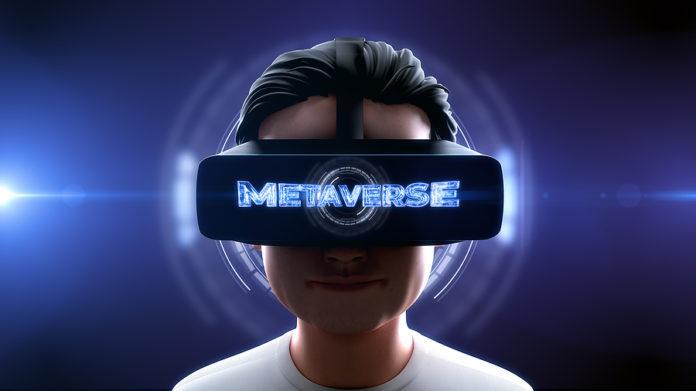
If there’s one thing that really can’t be done digitally, it’s eat. But that isn’t stopping food companies from establishing their places in the metaverse.
Food brands, including CPG companies, quick-service restaurants, and their suppliers, are starting to explore what the metaverse has to offer in the way of reaching and engaging with customers. And the opportunity is much bigger – this technology, currently very much in its infancy, has the potential to disrupt everything from how companies market their products to how they train their workers.
What is the metaverse?
So, what exactly is the metaverse? It’s a 3D virtual reality world where users interact with the environment and others via avatars.
As an easy way to think about it, WIRED’s Eric Ravenscraft recommends mentally replacing “the metaverse” with “cyberspace.” “Ninety percent of the time, the meaning won’t substantially change,” he writes. “That’s because the term doesn’t really refer to any one specific type of technology, but rather a broad (and often speculative) shift in how we interact with technology.”
Looked at this way, the concept is a little easier to grasp, especially if you think about the massive ways our interactions with technology have shifted over the past two decades. The metaverse is just an interactive virtual world.
Metaverse opportunities for the food industry
In a recent PwC survey, 66% of executives reported that their companies are actively engaged in the metaverse, and 82% said they expect metaverse plans to be part of their business activities within three years.
Those numbers sound high until you think about how many equipment manufacturers started offering virtual reality (VR) and augmented reality (AR) options for service and training during the pandemic. Over the past few years, virtual plant tours, digital twins of equipment, and AR-assisted service calls have become common offerings. They may not have specifically been touted as part of “the metaverse,” but they all fit the definition.
This trend toward the use of virtual worlds will likely continue as technologies improve and manufacturers start to realize the very tangible bottom-line benefits, such as the money saved from testing a piece of equipment before it’s even built. Keith Shaw, contributing editor for the Association for Advancing Automation identifies the following as the top five ways the industrial metaverse will benefit manufacturers:
- Training employees more quickly, more safely
- Simulations ahead of physical deployments can find improvements
- Using AR/VR for field service workers to repair equipment on the job
- Product design collaboration virtually around the world
- Building physical products from virtual designs; adding digital assets from physical items

The metaverse also offers huge potential for food brands to interact with consumers in new ways.
In PwC’s survey, 36% of executives said they plan to use the metaverse to create virtual content for customers to engage with. Coca-Cola is a leader among food and beverage brands in this area.
Last month, Coca-Cola celebrated its one-year anniversary in the metaverse by dropping a new digital collectible, of which there are now more than 4,000. People who own these digital collectibles have access to special perks, like Coke Studio experiences, gaming events, and early access to limited-edition product launches. Earlier this year, Coca-Cola launched the limited-edition Coca-Cola® Zero Sugar Byte, a gaming-inspired sparkling beverage that “[brings] the flavor of pixels to life.”
Providing these kinds of experiences may be key for food brands to re-engage consumers who have become more interested in private label since pandemic-related shortages meant they couldn’t find their normal brands, EY senior analyst Jon Copestake told Food Navigator.
Restaurant chains are also taking to the metaverse. McDonald’s, Wendy’s, and Chipotle have opened up virtual locations on Facebook’s metaverse (see Business Insider for descriptions and images), and several other restaurants, including Burger King, Yum Brands, and Chick-Fil-A have filed trademarks to join.
How companies can prepare for the metaverse
Whether you’re a food brand looking for new ways to meet consumers or an industry supplier incorporating digital tools into your offerings, the metaverse has something to offer.
As with any new investment, companies need to start with a strategy. PwC provides several pieces of advice. Here’s a brief overview of a few of their recommendations:
- Set people and tech priorities. The metaverse encompasses everything from augmented and virtual reality to blockchain and cryptocurrency, but not all technologies are right for all companies. Invest flexibly to achieve both short- and long-term benefits.
- Assess your risk and engage key stakeholders. Involve tax, security, privacy, risk, and compliance specialists from the very beginning of your metaverse journey.
- Use data with care. Have a data strategy in place to ensure privacy and make sure you can reach your goals.
- Be relevant, useful, and purposeful. Offer unique products and experiences that have lasting utility, and make sure your metaverse activities reflect your corporate purpose.





![[Webinar] Chaos into Clarity: Future Proofing Your Food & Beverage Company with ERP](https://foodindustryexecutive.com/wp-content/uploads/2024/07/Aptean-Chaos-into-Clarity-Future-Proofing-Your-Food-Beverage-Company-with-ERP-218x150.png)


